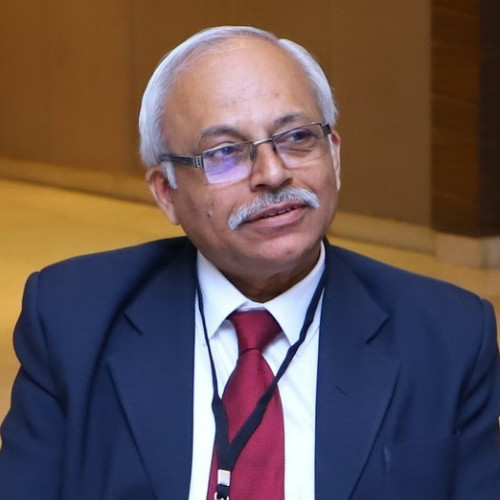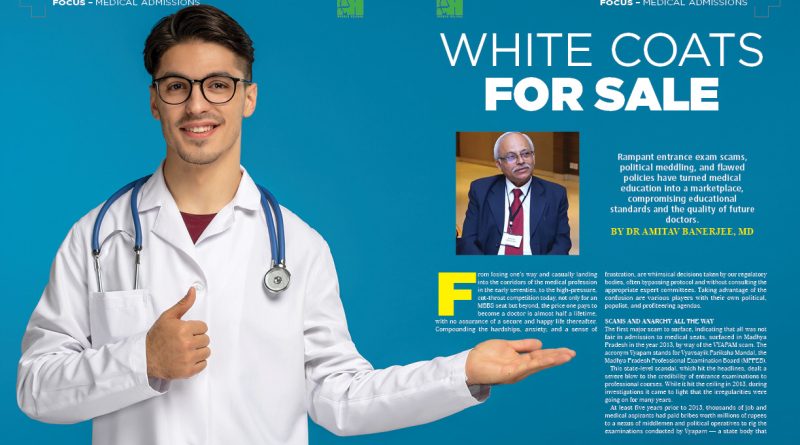White Coats for Sale

Rampant entrance exam scams, political meddling, and flawed policies have turned medical education into a marketplace, compromising educational standards and the quality of future doctors.
By Dr Amitav Banerjee, MD
From losing one’s way and casually landing into the corridors of the medical profession in the early seventies, to the high-pressure, cut-throat competition today, not only for an MBBS seat but beyond, the price one pays to become a doctor is almost half a lifetime, with no assurance of a secure and happy life thereafter. Compounding the hardships, anxiety, and a sense of frustration, are whimsical decisions taken by our regulatory bodies, often bypassing protocol and without consulting the appropriate expert committees. Taking advantage of the confusion are various players with their own political, populist, and profiteering agendas.
Scams and Anarchy All the Way
The first major scam to surface, indicating that all was not fair in admission to medical seats, surfaced in Madhya Pradesh in the year 2013, by way of the VYAPAM scam. The acronym Vyapam stands for Vyavsayik Pariksha Mandal, the Madhya Pradesh Professional Examination Board (MPPEB).
This state-level scandal, which hit the headlines, dealt a severe blow to the credibility of entrance examinations to professional courses. While it hit the ceiling in 2013, during investigations it came to light that the irregularities were going on for many years.
At least five years prior to 2013, thousands of job and medical aspirants had paid bribes worth millions of rupees to a nexus of middlemen and political operatives to rig the examinations conducted by Vyapam — a state body that conducted standardised tests for thousands of highly coveted government jobs and admissions to state-run medical colleges. When the scandal first came to light in 2013, it threatened to paralyse the entire state administration machinery: thousands of jobs appeared to have been obtained by fraudulent means, medical schools were tainted by the spectre of corrupt admissions, and dozens of officials were implicated in helping friends and relatives qualify by unfair means.
The investigation into the scam led to the arrest of many high-profile individuals, including politicians, government officials, and education professionals. A few political leaders and bureaucrats were also named as accused in the case. Thousands of candidates were part of the irregularities. The scam gained notoriety for several mysterious deaths among the accused, witnesses, and whistleblowers. The circumstances surrounding these deaths raised concerns and controversies. The large number of mysterious deaths among witnesses and whistleblowers might have silenced many from coming forth to testify, raising genuine concerns that many key players were acuitted.
Lessons Not Learnt — NEET Rocked by Controversy a Decade Later
The National Eligibility cum Entrance Test (NEET) was introduced in 2013 by the Medical Council of India (MCI) with the aim of streamlining the medical admission process in the country and ensuring that students are selected based on a single, standardised test rather than multiple state-level exams.
A decade later, in 2024, the NEET for MBBS entrance was rocked by allegations of irregularities, evidenced by many bizarre patterns in the results such as: Unprecedented Scores: A total of 67 candidates scored 720/720 this year, a “black swan event.” There were only two toppers who scored 720 last year, and in 2022, there were four. Concentration of Toppers: Six of the toppers were from a single examination centre in Haryana, with roll numbers close to each other. Credibility of Scores: Some candidates scored 718 and 719, which does not make sense as such scores are technically impossible. Four marks are awarded for each correct answer, while one mark is deducted for a wrong answer. So, if a student gets one answer wrong, the score will be 715; if they leave one question unanswered, the score will be 716. Questionable Explanation: When the National Testing Agency (NTA) was questioned about these scores, they explained that “grace marks” were awarded to candidates in some examination centres due to delays in starting the exams. Early Declaration: The NEET-UG results were declared on 4 June 2024, ten days earlier than the scheduled date of 14 June 2024. Some speculate this was done deliberately to suppress any protests, which would be overshadowed by the election results coming out on the same day.
The NEET 2024 controversy resulted in a Central Bureau of Investigation (CBI) probe, changes in the leadership of the NTA, and a Supreme Court ruling upholding the exam while directing systemic reforms.
Investigations by the Bihar Police and later the CBI confirmed that a paper leak occurred in Hazaribagh and Patna. The CBI revealed that the question paper was stolen from an exam centre just hours before the test and distributed to a limited group of students who paid significant sums. The CBI identified 144 students who benefitted from the leak and arrested numerous individuals, including the masterminds, exam centre officials, and “solvers” (MBBS students who helped solve the paper). The agency filed multiple chargesheets in the case. A major point of contention was the NTA’s decision to award grace marks to 1,563 candidates to compensate for lost time during the exam. Following widespread protests and petitions, the government and NTA cancelled the grace marks. A re-test was offered to these students on 23 June, and only about half chose to appear.
On July 23, 2024, the Supreme Court ruled against cancelling or re-conducting the entire NEET exam. It stated that while a paper leak was confirmed, there was no evidence of a “systemic breach” that compromised the exam’s integrity on a widespread level. The court acknowledged that a re-test would have “serious consequences for over two million students” who appeared for the exam legitimately. It upheld the exam but ordered the NTA to correct the marking for a disputed physics question, which affected the ranks of over four lakh candidates. A re-revised result was declared on 26 July. The court also allowed individuals with unresolved grievances to approach the High Courts.
Government Actions and Reforms: In response to the crisis, the government took several steps like the dismissal of the NTA chief, and the introduction of the anti-cheating law, The Public Examinations (Prevention of Unfair Means) Act, 2024, which was notified to provide stricter penalties for exam malpractices. An expert seven-member committee, led by former ISRO chief Dr. K Radhakrishnan, was formed to recommend reforms for the NTA and the examination process.
Ongoing Legal Challenges: While the Supreme Court’s verdict seemed to conclude the matter, a review petition was filed in early September 2024, arguing that new evidence indicated more widespread malpractice. The Supreme Court dismissed this review petition in November 2024.
NEET PG Entrance Standards for 2023 and 2024 Hit a New Low, With Candidates Scoring Zero and Negative Marks Getting Seats
For NEET PG 2023, candidates with zero and even negative marks qualified for admission, consequent to eligibility criteria reduced to zero percentile to fill vacant seats. This highly unprecedented step was taken to fill up the large number of vacant seats, thus giving priority to filling them up and sacrificing merit. This effectively removed the minimum score requirement, which was set at the 50th percentile, making anyone who appeared for the NEET exam eligible. This resulted in candidates with extremely low scores, such as some with negative marks, securing seats in high-fee private medical colleges. This brings to light a system failure where the ability to pay can be prioritised over merit. The disregard for merit compromises medical education standards and the quality of future doctors. Top scorers who cannot afford to pay the fees of private medical colleges compete for limited seats in government medical colleges, while those with the capacity to pay, regardless of merit, can secure admission. This state of affairs raises concerns about the competency level of such doctors entering the profession.
Tamil Nadu, West Bengal, and Karnataka Have Opposed NEET
Three states in India — Tamil Nadu, West Bengal, and Karnataka — have challenged NEET. They have pointed out that a centralised examination is a disadvantage for rural students from different states and for students passing state board exams compared to students who pursue a CBSE syllabus.
Tamil Nadu passed a resolution calling for exemption from NEET, suggesting that admission should be based on Class 12 marks. The state has also implemented a 7.5 per cent reservation for Government School Students who clear the NEET examination. Karnataka passed a resolution to scrap NEET and replace it with its State Level Common Entrance Test (CET). West Bengal passed a resolution to scrap NEET, arguing that it was never in favour of the national exam and prefers to revert to its old system of admissions.
While these states have passed resolutions challenging NEET, as yet, in practice, no state offers admission to undergraduate MBBS programs without a qualifying NEET score. All state-level and national-level medical admissions must comply with the National Medical Commission Act, which mandates NEET.
State Quota Seats vs. All India Quota (AIQ)
The confusion about non-NEET states often arises from the distinction between different seat quotas:
All India Quota (AIQ): The Medical Counselling Committee (MCC) conducts counselling for 15 per cent of the seats in government medical colleges and 100 per cent of the seats in central/deemed universities, based entirely on NEET scores.
State Quota: States manage the counselling for the remaining 85 per cent of their government medical college seats. While admission still requires a NEET score, state governments can apply their own reservation policies, including domicile rules, to fill these seats.
Compounding the Problems: MBBS in Hindi Medium and Integrated Dual MBBS and BAMS Degree Course
Adding to the complex problems of medical admissions, some states have taken unprecedented initiatives. States like Madhya Pradesh, Chhattisgarh, and Rajasthan have initiated MBBS courses in Hindi medium. Madhya Pradesh was the first to initiate a Hindi medium MBBS course in 2022, for which only 30 per cent of the students opted. There were multiple hurdles to this implementation, with requirements for bilingual textbooks and integrating medical terminologies in Hindi for a seamless learning experience. Many students admitted to the Hindi medium course chose to take the examination in English medium even after studying in Hindi.
Recently, it was announced that the Jawaharlal Nehru Institute of Post Graduate Medical Education and Research (JIPMER), Pondicherry, may offer India’s first integrated BAMS-MBBS program. The aim is to train doctors in both modern medicine and Ayurveda. The course duration will be five years, with a one-year internship.
Experts have raised legal, regulatory, and patient safety concerns. Surprisingly, the National Medical Commission and the National Commission for Indian Systems of Medicine were not consulted while preparing this proposal. Legally, there is no provision for a dual degree course. Such a drastic step, without the nod of regulatory bodies, raises doubts about the academic process and legitimacy of the course. Perhaps consequent to these concerns, JIPMER issued a statement that no such course is being offered presently.
The Way Forward
The country must urgently streamline the entire process of medical admissions, making it free of corruption, providing a level playing field, and rewarding meritocracy. For this, it must address the supply-demand mismatch by creating more government and affordable seats for meritorious students in private medical colleges. Politics, profit, and populist measures like Hindi medium MBBS courses or integrated BAMS-MBBS courses, should be held in abeyance till the mess in medical education is cleared.
(The writer is a renowned epidemiologist and Professor Emeritus at Dr DY Patil Medical College in Pune, featured in Stanford University’s list of the world’s top 2 per cent scientists (2023, 2024). He chairs the Universal Health Organization (https://uho.org.in/ and is the author of Covid-19 Pandemic: A Third Eye.)

